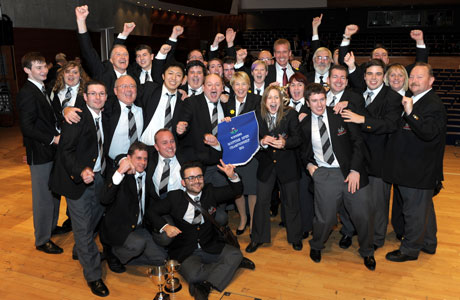
A Welsh win in Perth....
It’s strange how time can play tricks on the mind.
Twelve months ago, the Scottish Open was the talk of the banding world as, not for the first time, it promoted the music of a talented young composer in Simon Dobson.
However, it also took a step into the potentially fiery pit that is open adjudication.
Yet a year on in the acoustically satisfying surroundings of Perth Concert Hall there was not a murmur.
The contest felt absolutely right with three men sitting in judgement over the sixteen performances of ‘Music for Battle Creek’ in full view of the audience: It was just as if it had always been this way.
Wagging
A few hours later the tongues were wagging though.
Not even three eminent and trusted musicians in the shape of the composer, Robert Childs and John Wallace, could keep everyone happy with their eventual decision.
One band that certainly left for home happy though was Tongwynlais Temperance.
Dynamic
They made the long trip from South Wales to claim the Scottish Open title in emphatic fashion, thanks to a finely shaped, impressively controlled performance under the dynamic direction of Philip Harper.
The fact that Philip Sparke’s music tested all the bands to the limits came as no surprise.
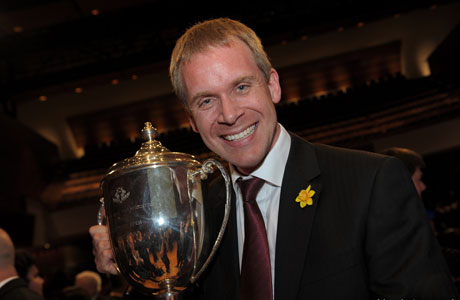
Smile please....
Eye popping
There was certainly no shortage of battlefield casualties, given that the work was originally written as a virtuoso vehicle to showcase the individual talents of a band packed with some of the finest players in the world.
It perhaps explained why there was such a diverse opinion from the judges about the performances they heard on the day.
John Wallace’s first place for Yorkshire Imperial against tenth and twelfth respectively from the other judges was just one of the more eye-popping variations that became evident when the results were displayed for all to see.
Diverse
However, when all too often all we get from some judges is an unbelievable ‘we agreed about all 16 places’, such diverse opinions are to be celebrated.
As a system it may have its flaws (5 judges would surely be better), but at least it’s honest and totally transparent.
Forget the stats. What emerged was a balanced rationalisation of subjective opinion, based on the judgement of musicians of the highest standing.
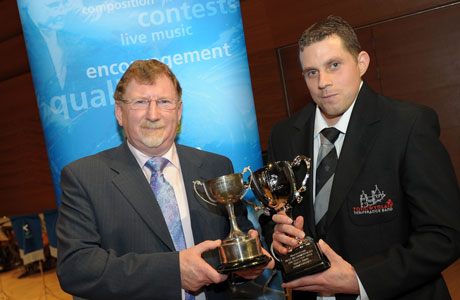
Top man: Martyn Patterson takes the 4BR Best Instrumentalist Award
Irrefutable
The one irrefutable statistical fact to emerge was that Tongwynlais Temperance were deserved victors.
A rather uneven season of despair turned into one of elation as they forgot earlier contesting disappointments and began to look forward to the New Year buoyed with optimism.
It was a fine victory; a combination of secure ensemble, classy soloists (chief amongst them Martyn Patterson on euphonium who deservedly claimed the 4BR ‘Best Instrumentalist’ Award) and a reading of the score from Philip Harper that took some idiosyncratic risks that just about all came off in spades.
The performance wore its heart on its sleeve at times with the MD’s elastic appreciation of the musical line, but in its atmosphere, precision and control (Ton were the only band not to spill over into hard edged aggression) it was the most worthy of winners.
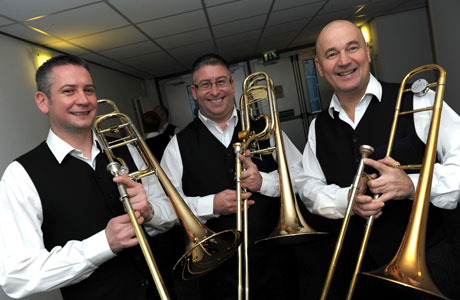
Trombone trio from the Co-op
Length or two behind
Behind them, and the opinions varied on the merits of performances that in truth were a good length or two behind the Welsh victors.
Although delivering a stylish musical rendition, Mike Fowles and Co-operative Funeralcare were almost de-railed by the immensely tricky opening of the Rondo Finale - a treacherous spot on the day.
Moments of captivating quality, including a magical Luminoso in the ‘Elegy’ contributed to the composer placing them first, whilst the stylistic elegance of the performance was never in question.
However, it was blighted by a high individual error count – one that even halved may well have seen Co-op retain their title.
Nasty errors
Exchange Communications Whitburn suffered much the same fate, with nasty errors serving to undermine some excellent ensemble work, detail and tonality in a performance of characteristically thoughtful preparation by Ian Porthouse.
However, poor individual tuning and a high unforced error count (although they had the outstanding baritone player of the day) tarnished a rendition that never quite lived up to its obvious potential.
Both Scottish ‘heavyweights’ were left to reflect on what might have been – although to their credit, neither felt they were robbed of victory.
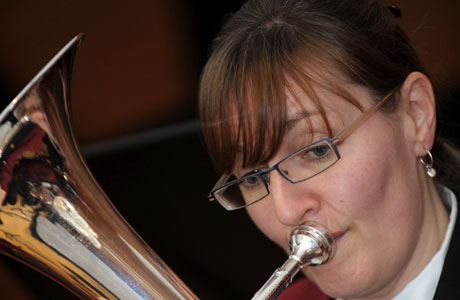
Best baritone of the day - Annie Crookston of Whitburn
High tempo
The English challenge was spearheaded by Marsden Silver with a performance high on tempo and excitement, if a little short on dynamic control, and tending like many to succumb to a harsh, brittle sound, by not fully appreciating the acoustic of the hall.
It was a performance of a band with the obvious potential to bridge the step up in class required to win this type of second tier major contest – but still with a little work to do under their talented MD Glyn Williams.
Solid
So too United Co-op Milnrow in fifth.
Theirs was perhaps the surprise package of the contest, but their solid, no nonsense approach under Marieka Gray’s clear direction impressed all that heard them.
The subtle stylistic nuances were not as clearly defined as those above them in the prize list, but the obvious strengths of secure delivery certainly were.
They are a band to watch out for on this form in 2012.
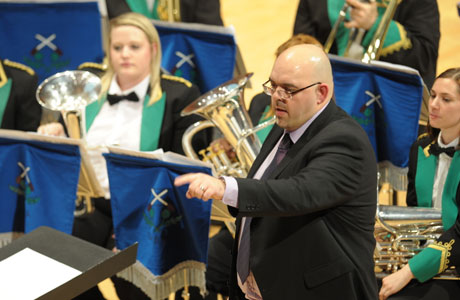
Pointing to the prizes for Glyn Williams of Marsden
Fine end
Kingdom Brass claimed sixth – a fine end to the conducting tenure of Andrew Duncan, who spent the weekend doing an equally fine job in his SBBA Development Officer role.
A rather uneven rendition had its moments, helped by some fine solo contributions, even if its ultimate finish was perhaps more a result of the variable quality of the bands that ended behind them.
Yorkshire Imperial Urquhart Travel elicited mixed opinions all round – from first to twelfth from the three judges, although their eventual seventh place was perhaps a tad unlucky for a performance blighted by some poor tuning but full of drive and energy.
Coherent
Perhaps the contest’s most coherent interpretation of the score came from Archie Hutchison with Dalmellington, who couldn’t quite match the tasteful musical intentions of their MD in their uneven execution to end in eighth.
If they had, it would have been a potential podium finisher.
There was something to enjoy in each of these variable performances – a reflection perhaps of the final placing from the individual judges.
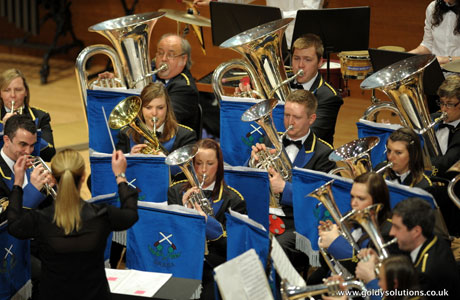
Massed ranks for Milnrow
Consistency
As always, inconsistency of delivery blighted the top six aspirations of many a contender.
Pemberton Old Wigan JJB, Fishburn and Felling all delivered frustratingly uneven accounts - a mix of the very good, the average and the occasionally pretty dire.
Pemberton in particular, ranged from notable elegance in the Luminoso of the ‘Elegy’ to an aggressive angst in the ensuing Estatico - an uneasy balancing act at the best of times.
Articulate
Fishburn meanwhile were aided by Allan Morrison’s articulate direction, but just needed a greater degree of subtly in execution, whilst Felling (with the best sop of the day) will return home rueing their lack of finishing straight Rondo pace.
Bottom five
For the bands occupying the bottom five positions, the challenges of ‘Music for Battle Creek’ proved almost insurmountable, despite valiant efforts in the cases of Lochgelly and Blackburn & Darwen, the former gaining a creditable sixth place from John Wallace.
Regent’s brave effort claimed two top ten finishes from the judges as well as a last place to end in twelfth, thanks to a structured reading from the MD and plenty of commitment from around the stands.
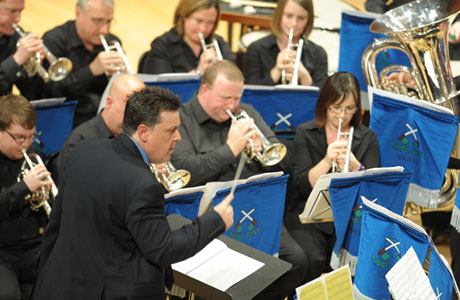
Top six end for Andy Duncan and Kingdom Brass
Re-grading debate
With a great deal of debate in Scotland surrounding the true level of many ‘championship’ bands, the performances of Newtongrange and Bo’ness & Carriden in filling the bottom two places perhaps emphasised the need for the re-grading of bands, and not the down-grading of test pieces for contests such as this.
As has become customary in Perth, the dulcet tones of compere Alasdair Hutton lent a professional air to the on stage proceedings, whilst SBBA Events Manager Peter Fraser and his team ran the contest with the kind of precision and attention to detail that would merit sponsorship by Rolex.
Where else would it be printed in the programme that a section is due to start at 11.56am with every band receiving a schedule showing their allocated times in the warm up room to the specific minute?
Listening
Listening to talk around the hall, the bands themselves were clearly appreciative.
The journey to Perth might be a gruelling one for many competitors, but with a tempting first prize of £3,000, the one notable disappointment was that there weren’t more top name band’s supporting what has evolved into one of the highlights of the contesting calendar.
Chris Thomas













